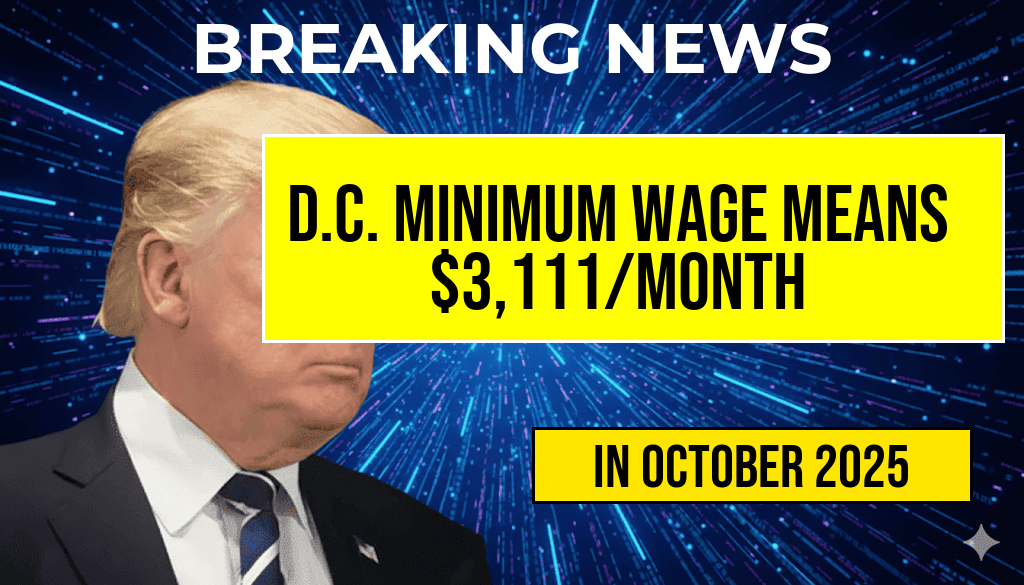DC Families See Monthly Earnings of $3,111 Before Taxes at $17.95 Minimum Wage
For full-time workers in Washington, D.C., earning the current minimum wage of $17.95 per hour translates into approximately $3,111 per month before taxes. Based on a standard 40-hour workweek, this income positions many families at a modest financial threshold, prompting discussions about affordability and living standards in the nation’s capital. While the minimum wage has increased over recent years to address rising living costs, many families continue to face challenges balancing expenses such as housing, healthcare, and childcare. This analysis explores what earning $17.95 an hour means in terms of monthly income, how it compares nationally, and what it implies for D.C. households striving to meet their financial needs.
Calculating the Monthly Income from Hourly Wage
| Hourly Wage | Hours per Week | Weeks per Year | Gross Monthly Income |
|---|---|---|---|
| $17.95 | 40 | 52 | $3,111 |
Based on a 40-hour workweek, earning $17.95/hour results in an annual gross income of approximately $37,336. This figure is obtained by multiplying the hourly wage by weekly hours and then by the number of weeks worked annually, and dividing by 12 months. It’s important to note that actual take-home pay varies after federal, state, and local taxes, as well as deductions for Social Security and Medicare.
Comparison to National and Local Living Standards
The $3,111 monthly gross income places D.C. workers near the lower-middle income bracket but reveals the ongoing cost-of-living pressures in the city. According to the U.S. Bureau of Labor Statistics, the median household income in Washington, D.C., hovers around $92,000 annually, significantly higher than what minimum wage earners bring in. However, many residents earning minimum wage are either single adults or part of low-income households, where this income can be stretched thin.
Housing costs are a primary factor influencing financial stability in D.C. The city’s median rent for a one-bedroom apartment exceeds $2,000 per month, according to recent data from Zillow. Healthcare, transportation, and childcare expenses further strain budgets, often leaving minimum wage earners with limited savings or disposable income.
Impacts on Families and Policy Discussions
For families with children or multiple dependents, earning $17.95 per hour can be insufficient for covering basic needs. The Urban Institute emphasizes that low-wage workers in D.C. often face housing insecurity, with many paying a disproportionate share of their income toward rent. This situation raises questions about the adequacy of the current minimum wage and whether further increases could help bridge the gap between income and living expenses.
Considerations for Policy and Economic Trends
While the $17.95 minimum wage was established to improve earnings for the city’s lowest-paid workers, economic analysts suggest that real affordability depends on multiple factors beyond hourly pay. Opportunities for career advancement, access to affordable healthcare, and affordable housing initiatives are critical components in elevating economic stability for low-income families.
Recent proposals aim to tie minimum wages to inflation or regional cost-of-living indices, reflecting ongoing debates about ensuring minimum wages keep pace with economic realities. The federal minimum wage remains at $7.25 per hour, but many states and cities, including D.C., have implemented higher rates to address local costs.
Summary
- Full-time minimum wage workers in D.C. earning $17.95/hour make about $3,111 per month before taxes.
- This income supports a modest lifestyle but often struggles against high housing costs and other living expenses.
- Addressing affordability requires multifaceted approaches, including wage increases, affordable housing policies, and social services.
As D.C. continues to grow economically, understanding the real-world implications of minimum wage levels remains crucial for policymakers and community advocates committed to fostering economic resilience among its lower-income residents.
Frequently Asked Questions
What is the current minimum wage in D.C. for full-time workers?
The minimum wage in D.C. is $17.95 per hour for full-time workers, effective as of the latest update.
How much can a full-time worker expect to earn monthly before taxes at this wage?
At a $17.95 hourly wage, a full-time worker can expect to earn approximately $3,111 per month before taxes.
How is the monthly income calculated from the hourly wage?
The estimated monthly income is calculated by multiplying the hourly wage by the number of hours worked in a month, typically assuming 40 hours per week and approximately 4.33 weeks per month.
What taxes might affect the take-home pay from this wage?
Taxes such as federal income tax, state or local taxes, Social Security, and Medicare will reduce the net pay received by workers.
How does this minimum wage compare to the cost of living in D.C.?
The minimum wage of $17.95 per hour provides a gross monthly income of about $3,111, which may be challenging to cover the cost of living in D.C., including housing, transportation, and other expenses.









